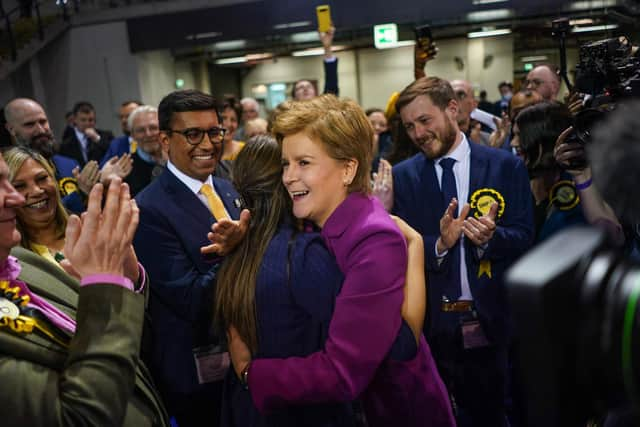Scottish independence: Unionists should learn from history and form an anti-SNP alliance – Alastair Stewart
Like Thompson in ’72, voters across Scotland are forced to settle for parties that are "not the other guy". Or, in this case, "not about independence”.
Overall, May's local elections might have been a resounding win for the SNP, but the results are confused given the number of coalitions likely to be formed across Scotland's 32 local authorities (as was the case after 2017).
Advertisement
Hide AdAdvertisement
Hide AdBeyond satiating the obsession with independence, something needs to be done to break the deadlock of SNP dominance that is stifling focus on the cost-of-living crisis, the escalating energy crisis, the war in Ukraine, and imploding NHS.
Whether anyone likes it or not, the only party that has a chance of breaking the stalemate is a robust, centre-right alternative.
The problem with the Scottish Conservatives is their association with the UK party and the accusation they are a "branch office" for London. In 2021, the Scottish Conservatives matched their best performance at the 2016 Holyrood elections, winning 31 seats.
At the local elections this year, they lost 62 seats, something leader Douglas Ross blamed on Partygate at Westminster.
Like a Chinese finger trap, the success or failure of the Scottish Tories is down to the perceived connection to Westminster. Members and voters rally around it as a vehicle to defeat the SNP; critics make the party a bogeyman in Scotland for the failures of the UK party.


Part of this is fiction and reality. It ignores that Ruth Davidson and Douglas Ross have publicly disagreed with David Cameron, Theresa May, and Boris Johnson about Brexit and Downing Street excess. The electorate has a pervasive feeling that what the UK party says goes, no matter what the Scottish leadership says.
It is a lingering issue identified in the independent 2010 Sanderson Commission report to “review the structures, function and operational activity of the Scottish Conservative and Unionist Party”.
Its comprehensive findings indicated the need for an elected Scottish leader (which has since come to pass) because there was a "lack of clarity of leadership, accountability and decision-making”.
Advertisement
Hide AdAdvertisement
Hide AdConfusion amongst voters about where the buck stops is the Scottish Tories' most significant challenge. Nor is it a new issue. It is only half true to say the last time the Tories won an election in Scotland was in 1955 because then it was the Unionist Party.
The titular union in question was the 1800 Irish Union, and the party's origins were linked to the 1886 split of the Liberal Unionist Party over Ireland. Still, it is a quirk of history that it has come to mean preserving the 1707 United Kingdom (if not the European Union).
Formed in 1912, the Scottish Unionists merged with the UK party in 1965, and the Scottish Conservative and Unionist Party came to be under the umbrella of the UK party. Trickling through to the present day is a conflation between the two as the Unionists took the whip at Westminster.
More confusing still was that Prime Ministers Andrew Bonar Law (1922-1923) and Sir Alec Douglas-Home (1963–1964) were Scottish Unionist MPs who led the UK Conservative Party. Senior Unionist MPs, notably Scottish secretaries of state like James Stuart (1951-57), muddied the historical perception for casual observers because they served in Conservative governments.
Critically and somewhat lost to time, the Unionists did not generally field local candidates; they supported the Moderates and later the Progressive Party at a municipal level based on cooperation with the Scottish Liberals and independents to rout support for the burgeoning Labour party.
The SNP of their day, the Unionists, were the pre-eminent political party in Scotland for the first half of the 20th century as sure as the Liberals were in the 19th and Labour was to become.
Superb books like Whatever Happened to Tory Scotland by David Torrance, Tom Devine's Scotland and the Union 1707-2007, and Andrew Liddle's biography of Ruth Davidson chart the myriad of complicated factors that informed unionism, the challenges it faced and the expressions it found.
The latest dogfight about who is or is not a puppet of Boris Johnson in Scotland is a very old fight about Scottish parties with mixed identities and loyalties.
Advertisement
Hide AdAdvertisement
Hide AdIn the party leadership elections in 2011, former Scottish Conservative deputy leader Murdo Fraser proposed disbanding the party to create a new Scottish party of the centre-right. The move was opposed by Ruth Davidson, who eventually won, and she was proven correct as the party's fortunes took an upward turn.
After the disastrous local election results, a minor flirtation with the idea is back. Douglas Ross stands up at First Minister's Questions every week, makes a legitimate point, and the First Minister usurps him and blames Westminster. The triangulation is frustrating and stymies serious accountability of the SNP administration.
Davidson was correct when she dismissed the new calls for a new centre-right party as a "short route to electoral suicide". A parliamentary Unionist Party would not work under devolution; it would split the vote when its precarious bounce back needs to be guarded.
Withdrawing Conservative, Liberal and Labour contenders at local elections and fielding Better Together-esque candidates in an anti-SNP alliance may well be the future.
Fraser and others were close with their solution. The tacit agreement between major parties to support the Moderates and Progressives to defeat Labour is the inspiration to tackle the SNP.
Comments
Want to join the conversation? Please or to comment on this article.
